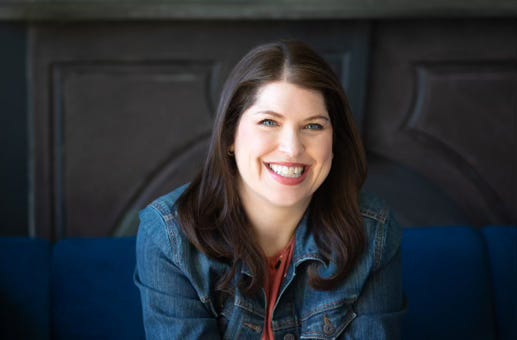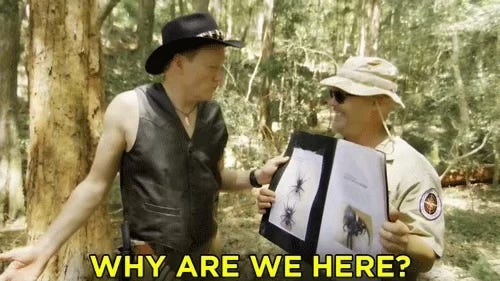How to Handle One-Sided Conversations and Friendships with MODERN FRIENDSHIP author Anna Goldfarb
Did you know you can give your friends direct feedback? Whaaaaat?
Dearest readers, you know all too well that one of my soapboxes is about sharing yourself with others: Share more of yourself! Share some of your mess to be human and relatable! Give people something to work with by letting them in on your life!
This is especially important for folks with social anxiety because too often, we feel like sharing any of our life is a burden to others, is boring, or will open us up to criticism. But then we come off as cagey or guarded; if we don’t show much, nobody knows much.
I’m 100% on Team Sharing, BUT because sharing about ourselves inevitably involves other humans, it can absolutely go pear-shaped.
To wit: a reader wrote in with a conundrum: Lightly edited for clarity, she said:
“I push myself to share with a few people I want to get to know better and be closer with. However, no matter what I share, I don’t get much back, or they change the subject and continue to make it all about themselves.
These feel like one-sided friendships because they don’t seem to care about trying to get to know me or they think they know me when really they don’t. Sometimes I feel like they aren’t even listening to me when I speak.
It makes me question: is it really worth my time and effort to share with this person?”
Sometimes those of us familiar with social anxiety tend to attract over-sharers or non-listeners because we’re on the more reticent side and inadvertently provide more space for them to fill. But that doesn’t mean we only want to be an audience!
To answer this question, I turned to the wisdom of Anna Goldfarb, friendship correspondent for The New York Times and, fittingly, my friend! She’s the author of the hot-off-the-presses Modern Friendship: How to Nurture Our Most Valued Connections, which is not only an invaluable guide to growing and maintaining our friendships, it’s also hilarious and I promise you’ll laugh out loud as you read.
Therefore, to answer our question about one-sided conversations and friendships, here’s Anna:
Hello reader! This is a great question. I’m detecting two related concerns: 1) how to handle a one-sided conversation and 2) how to handle a lopsided friendship dynamic.
We all seem to have that friend who’s so preoccupied with themselves—their grievances, their grudges, their frustrations—that there doesn’t seem to be room for you, too. This is such a common occurrence in relationships.
I have a friend who dominates our conversations as well. I could step away from the phone, make a plate of spaghetti, return to the call and she wouldn’t even notice I left. She’s not a bad person; she’s just oblivious to my discomfort because she’s so preoccupied with herself and her problems.
The disconnect is that my friend assumes that sharing so much of her life will help me feel closer to her. However, her selfish behavior actually pushes me away. But I’ve endured it! For years! Why? Because most of us aren't socialized to offer direct feedback to our friends. It’s so profoundly uncomfortable that many of us (i.e., me) will avoid it indefinitely.
However, as someone who wrote a book about managing and maintaining friendships, my approach to self-obsessed friends like this is changing. When it comes to handling a one-sided conversation, I could say any of these things to this friend, depending on our vibe:
Me: “Are you open to some feedback about our conversations?”
Friend: “Sure.”
Me: “I notice sometimes that we spend a lot of time unpacking your problems. It leaves me feeling like my life isn’t as important when we talk.”
Then I could see what the friend says in response. Hopefully, they will be receptive.
Or, option #2:
“Hey, buddy! You know I value our friendship. I’m unsure if you’re aware of this, but I’ve noticed you tend to dominate our conversations. I’m sure that’s not your intention. Mind if we level the playing field when we talk, so to speak? I love when I get to share my life with you too!”
Or, if we’re really close (like sibling-level close), I could even say:
“Truthbomb: I feel like you’ve been monopolizing our conversations lately and I don’t love that. Mind if we make more of an effort to have room for us both?”
If you do bring this issue up, make sure you have drinks and food available. This tends to put people at ease, which will increase chances that your friend will be receptive to your suggestion.
Another strategy I’ve started using is to model the behavior I want to see from my friends. I do this by offering time limits and asking for consent. I’ll say, “Hey, can I vent for five minutes? No need to give advice, I just need your ear.” My goal is to let her know that our friendship is evolving into one that asks for consent and time limits before unloading. You could even be explicit about it: “New rule: since we’re both busy, let’s give each other a time limit before we launch into a complaint session.” And crucially, stick to the time limit you give one another.
These are all good strategies to start, no matter what your relationship is.
As for handling a lopsided friendship dynamic, well, that’s a bigger issue. In fact, I’ve written about how to handle lopsided friendships before for Vox. Perhaps your friend doesn’t have the same social capacity or interest in maintaining a friendship with you, which is why they don’t initiate with you.
In researching my book, Modern Friendship, I learned that every friendship needs an about, a clear and compelling reason for both people in the friendship to seek one another out. Perhaps the about of this particular friendship has become outdated, or worse, absent. That could explain why this friendship doesn’t feel nurturing. Maybe the about of the friendship is that this person just unloads on you, which obviously isn’t compelling to you!
If you’re not interested in negotiating a new about for the friendship that will reset your dynamic, then you have my blessing to shuffle this friendship to the outer rings of your social life.
Sometimes, people have to learn these lessons in their own time. Maybe you can pick the friendship back up once your friend has matured and polished their social skills. With friendships, I’ve learned that anything is possible as long as mutual desire to be in the friendship together is present.
Thanks, Anna! You’re a peach and a half! Check out her brand new book, Modern Friendship, or her Substack, Friendship Explained, for more!
Next newsletter, we’ll talk about how to take self-criticism less literally. See you then!
Be kind to others and yourself!









This is so great! Thanks for having me guest on this week's newsletter, Ellen!